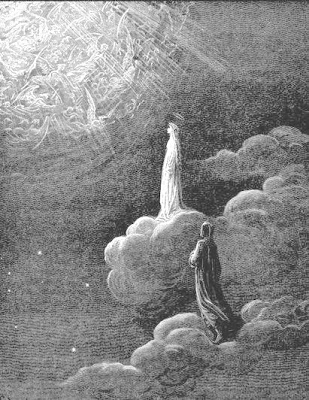Quomodo sedet sola civitas plena populo
 Beatrice and Dante in Paradiso, engraving by Gustave Doré |
Beatrice has gone to heaven above,The translation is a mixture of the work of A. S. Kline and Stanley Applebaum. I am in the throes of a summer-long obsession with Dante, since near the end of June I will be leaving for several weeks in Siena to take part in a seminar on Dante's Commedia, sponsored by the National Endowment for the Humanities. The music and arts coverage will continue, but there will be regular notices from our travels and study together in Siena.
to the realm where the angels have peace,
and stays with them, and has left you, ladies:
she was not taken from us by a chill
or a fever, as other women are,
but it was only her great gentleness:
for light from her humility
pierced the skies with so much virtue
that it made the eternal Lord marvel,
so that a sweet desire
moved him to claim such greeting:
and called her from here below to come to him,
because he saw this harmful life
was not worthy of something so gentle.





















































No comments:
Post a Comment